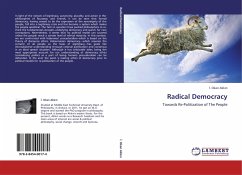In light of the notions of legitimacy, autonomy, plurality, and action in the philosophies of Rousseau and Arendt, it can be seen that formal democracy, having ceased to be the expression of the sovereignty of the people, fell into a legitimacy crisis and has become a system which makes the people apolitical. The facts in question have pushed philosophers to re-think the fundamental concepts underlying democracy and search for new conceptions. Nevertheless, it seems that no political model can succeed unless the people reach a certain level of ethical maturity. In this context, we are confronted with Habermas proceduralism which is based on the theory of discourse ethics. Habermasian democracy which assumes the consent of all people as the basis of legitimacy has goals like intersubjective understanding through rational justification and consensus in an ideal speech situation. Although it has criticizable sides, being the most appropriate account for our understanding of democracy ethics (considering politics as a part of being human) proceduralism can be defended. In the end, the point is making ethics of democracy prior to political models for re-politization of the people.
Bitte wählen Sie Ihr Anliegen aus.
Rechnungen
Retourenschein anfordern
Bestellstatus
Storno








